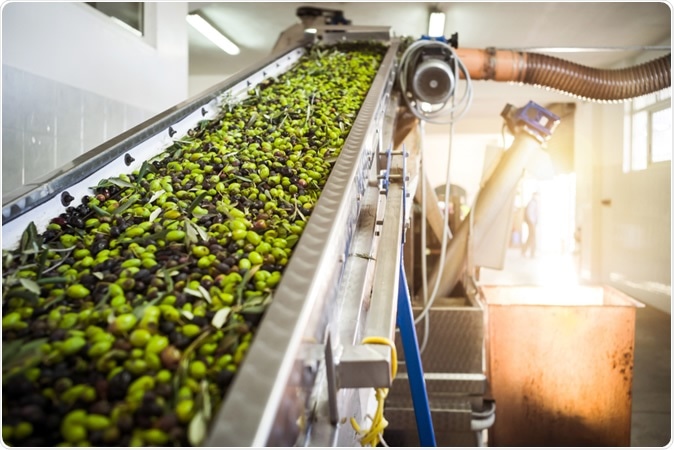There have been many past studies that show consumption of extra rich virgin olive oil (EVOO) in the diet is beneficial for health. Also, previous studies have look at the antioxidant potential of this oil and the potential mechanism by which it can benefit health. There is, however, limited research that looks at the use of olive oil in cooking. To address this, researchers from the University of Barcelona took up a study to check if heating altered the benefits provided by EVOO. The new study titled, “Domestic Sautéing with EVOO: Change in the Phenolic Profile,” was published in the latest issue of the journal Antioxidants.
The team of researchers wrote that EVOO was one of the standard cooking oils used in the Mediterranean diet, regarded as one of the healthiest diets. It is the primary source of fat in this form of diet and is considered to be rich in antioxidants. If proven to be the best among all the cooking oils, nutrition guidelines could recommend EVOO for health benefits, say the researchers.
The team of researchers from the Faculty of Pharmacy and Food Sciences of the UB, the Physiopathology of Obesity and Nutrition Networking Biomedical Research Centre (CIBERobn) and the University of São Paulo collaborated on this study to come to these conclusions.

The making of extra virgin Olive Oil in Mola di Bari, Puglia, Image Credit: Sabino Parente / Shutterstock
How
The team wrote that the benefits provided by EVOO could be due to the polyphenol profile, and when cooking, these polyphenols could be destroyed in the heat. Since most of the cooking oils are exposed to heat, this could be a problem.
For the study, the team looked at the effects of temperature and time or duration of exposure to heat on the polyphenolic profile of EVOO. They particularly looked at the internal process of pan-frying in their study. The researchers simulated the cooking conditions of a domestic kitchen. The aim was to see how the homemade sauté affects the polyphenols of extra virgin olive oil. Researchers studied the effects of time -during a short and a long period of time- and temperature -at 120ºC and 170ºC- in the degradation of the antioxidants. Rosa M. Lamuela, director of the Institute in Research on Nutrition and Food Safety (INSA-UB) said, “The effects of cooking on these polyphenols of oil have always been studied in a laboratory or industrial situation, which is far from the reality of our homes.” Thus the team tried to replicate actual home settings in their experiment, she said.
Finally, the content of polyphenols was assessed using UPLC-ESI-QqQ-MS/MS process wrote the researchers.
Results
The results of the study showed that during the process of sautéing, there was a definite degradation of the polyphenols of EVOO. Time also played a role, the researchers found. It affected some of the phenols such as hydroxytyrosol, but the overall content of polyphenols was unaltered with the long term heat exposure to the oil. The team noted that at 120 °C there was a 40 percent decline in the polyphenol content and a 75 percent decline at 170 °C when compared to unheated raw EVOO. The team wrote in conclusion; however, “Cooked EVOO still meets the parameters of the EU’s health claim.”
Julián Lozano, first author of the study and doctoral student at the university, said, “Despite the decrease in concentration of polyphenols during the cooking process, this oil has a polyphenol level that reaches the declaration of health in accordance to the European regulation, which means it has properties that protect oxidation of LDL cholesterol particles.”
Diet recommendations and future research
The team of researchers felt that the Mediterranean diet remains the most recommended diet form, but there has been little evidence to show if this diet could be as beneficial to non-Mediterranean populations. This study would add to the fact that the Mediterranean diet is equally beneficial with different means of cooking it.
The team concluded, speaking about future studies, “...we should conduct random research studies in humans, in which we would compare the potential benefits we obtain when cooking with quality extra virgin olive oil compared to other oils.” The effects of EVOO when combined with other foods such as meats, legumes, and vegetables also need to be explored they wrote.
The Mediterranean diet comprises of fruits and vegetables, whole grains, legumes, low-fat milk or dairy products, olive oil, eggs (less than 4 per week), nuts, moderate amounts of red wine (less than 5 ounces in women and 10 ounces in men), omega 3 fatty acid-rich oily fish and unsaturated fats. The diet avoids red meats and trans fats and saturated fats.
Journal reference:
Domestic Sautéing with EVOO: Change in the Phenolic Profile, Julián Lozano-Castellón, Anna Vallverdú-Queralt, José Fernando Rinaldi de Alvarenga, Montserrat Illán, Xavier Torrado-Prat and Rosa Maria Lamuela-Raventós, Antioxidants 2020, 9(1), 77; https://doi.org/10.3390/antiox9010077